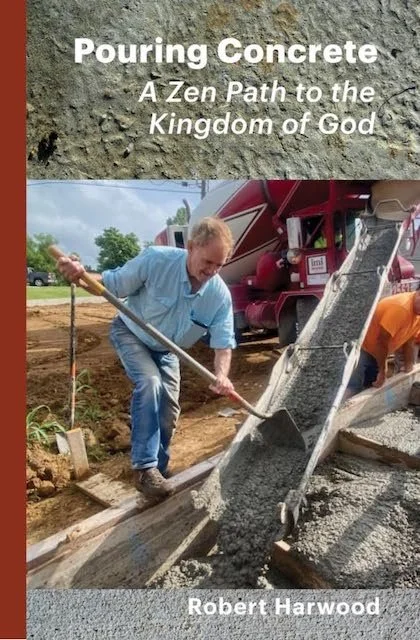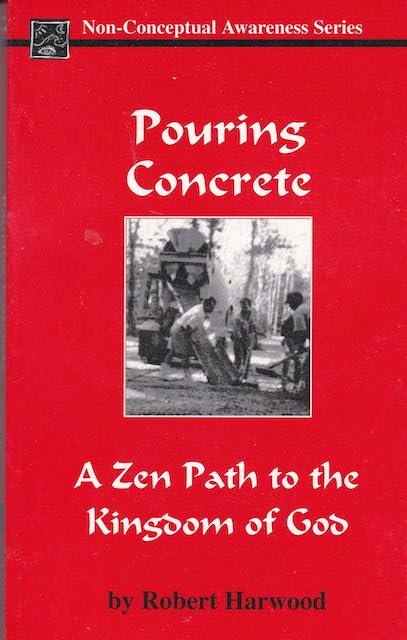Pouring Concrete: A Zen Path to the Kingdom of God by Robert Harwood
'Many religious traditions encourage us to imagine that the reward for living a spiritually exemplary life is a ticket to heaven where everyone wears white robes and choirs of angels singing softly in the background. In fact, the kingdom of god is a much more fascinating place than that. In the kingdom of God, people pour concrete, shovel snow from sidewalks, visit shopping malls, meet with friends, get sick, have accidents, encounter all kinds of challenging problems, and die. How it's possible to verify this claim is the focus of the book.'
I first heard Robert Harwood when he was a guest on the excellent 'Buddha at the gas pump' podcast (Youtube video at bottom of page) where Rick Archer interviews people who have had spiritual experiences or awakenings. I look forward to new episodes and have been introduced to so many spiritually interesting people.
What struck me immediately about Robert Harwood as he related his story was his exuberance and joyful demeanor. Sometimes a speaker just resonates with me and as Harwood told his story the transmission was immediate. I love it when this happens, which has been more and more recently. Ten minutes into this interview I'd ordered 'Pouring Concrete: A Zen path to the Kingdom of God'.
Bob the Builder
Bob Harwood is a construction contractor and architectural designer, hence the title. He's a practical man, which is why this book seems so relatable - there's nothing wafty or wishy-washy about this. He tells the story with a matter of factness that makes it really easy to understand and relate to.
Harwood's story starts with his initial awakening, which is like a scene out of 'Fear and loathing in Las Vegas' or when 'The Wizard of oz' switches to colour. There's a real joyfulness in his telling of the story, and you can sense the shifting of his identity, or rather the falling away of his old self.
The start isn't the end, however, as after this 'honeymoon' period, remnants of the old 'identity' remain. Ultimately this further search results, fifteen years later and after multiple realisations, in what could be termed a liberation, which this time was permanent.
Waking Up
'Spirituality means waking up. Most people, even though they don’t know it, are asleep. They’re born asleep, they live asleep, they marry in their sleep, they breed children in their sleep, they die in their sleep without ever waking up.' Anthony De mello
He was brought up in a fundamentalist Christian tradition, so that informs a lot of his early religious identity. He starts to examine his beliefs, before he then majors in Science at college, developing an interest in logic and philosophy. What's clear about Harwood throughout is the intensity of his search - his inquiries are turbocharged, and he's insatiably curious. I wish I had even a fraction of his fervor; if I started after breakfast I think I could be liberated by lunchtime.
Zen Retreats
What I liked was his complete honesty about his search, and he is especially candid on the toll that it takes on his relationship with his wife. There are a lot of zen retreats and even the building of a center, which take a lot of time and commitment - at one stage he even considers setting up a church. I enjoyed reading about his interactions with the various zen masters he meets, and for the first time I really understood what a Zen Koan actually is after his descriptions.
You see how it changes him. At one stage he has to be talked out of giving his company away to his employees. He also thinks about leaving work completely and going and meditating on top of a mountain, until he's pouring concrete one day, and bang! He realises that at that momment he had to be pouring concrete, nothing else. It seems that's how reality unfolds - we are doing exactly what we should be doing.
'The truth was always present, and by focusing on whatever was happening in the present momment, I could always know what I had to be doing. Within a few more weeks, I no longer had to ask myself what I must be doing in the present momment to see and understand that my path was unique. I wasn't the Buddha. I wasn't Rinzai, and I wasn't Jesus Christ. They had their own unique paths to follow. I was 'Bob the builder,' and my job was to pour concrete.'
Hiking
I also really enjoyed his descriptions of hiking and it reinforces the idea that being in nature can help with our awakening. There's a sense of wonder in his descriptions, a unification. Eventually, as he is hiking on Mount Audobon, his conditioned false sense of identity falls away, and what he'd describe as 'unity conscious' takes place. This isn't the end, and Robert says that an unfolding continues to take place, with further realisations, but it does seem to be the end of the 'small self.'
What I'm learning more and more about 'awakening' (that's only a label, as I can't think of a better term) and reinforced by this book, is that you don't have to spend years of your life cross-legged on a cushion up some mountain on a retreat. You can be shifting from your constant thoughts, those ten different DJs on radio stations playing in your head. Walking, shopping, driving, or yeah, pouring concrete. You begin to access the gaps of silence before thoughts, after thoughts, between thoughts, and you rest there.
And Bob's story emphasises that every unfolding is unique to us, that we all have our own paths (it's not a path though - it was always here, because wherever you go, there you are. You can't go back to what you never left, etc). A flower doesn't need to know how to blossom, nor a tree how to grow.
Summary
I also really appreciated the epilogue and addenda at the end of the book, where Bob Harwood answers some existential questions and expounds on his own model of mindfulness called ATA-T. This stands for 'Attending the actual minus thoughts' and it's a really simple method of shifting sensory perception to what can be seen, heard, felt, smelled, or tasted. It's an incredibly useful section that I've now read a number of times and will keep referring to.
I started this book before I went into a five day home retreat, and it was a fascinating and inspiring read that resonated with me just as much as the podcast interview did. This will interest anyone interested in spiritual journeys, awakening, non-duality, Zen Buddhism - it's a really interesting personal story, told with genuine joy and zeal.
Published 24th August 2023 by TAT foundation press
297 Pages



